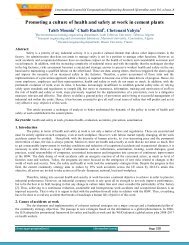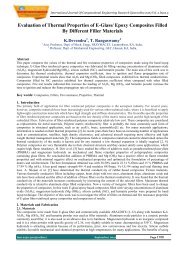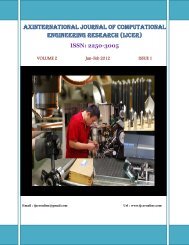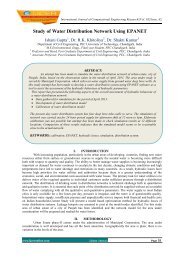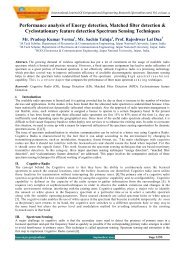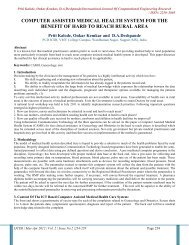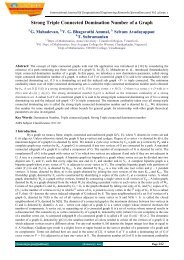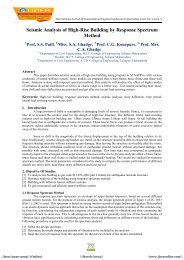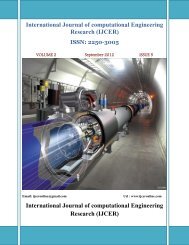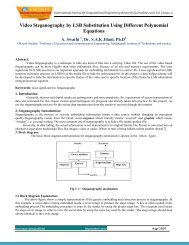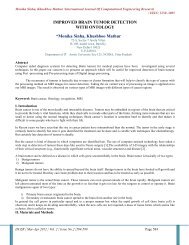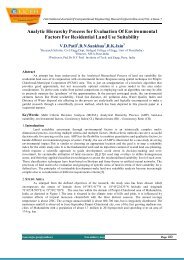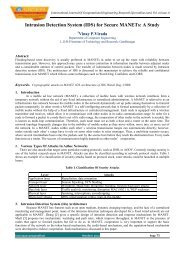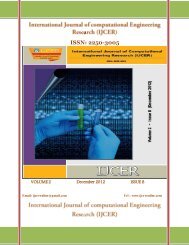Download - ijcer
Download - ijcer
Download - ijcer
Create successful ePaper yourself
Turn your PDF publications into a flip-book with our unique Google optimized e-Paper software.
Walking the talk in training future…<br />
syllabus and materials used in this class embrace diversity. They fall short in proposing a rigorous plan on the<br />
implementation of a cultural relevant pedagogy.<br />
Class 2 portrayed dynamic relationships between the instructor and students. Roles were shared<br />
amongst class participants. Students became instructors more often, and the instructor became a co-learner. Cooperative<br />
learning dominated this classroom practice and students’ ideas were valued. The instruction in this<br />
classroom models a healthy platform to integrate a culturally affirming instruction. The relationships are of<br />
mutual respect, trust and caring nature. However, curriculum does not cater for multiculturalism combined with<br />
the instruction but the text used embraces diversity and expose student teachers to the diverse experiences<br />
teaching holds. Therefore the syllabus and instruction employ a monocultural environment while the text brings<br />
in liberal multiculturalism.<br />
In summarizing Class 2 practices multicultural education here is treated as the “other” not the part of<br />
the whole process of learning (Gorski, 2009). These findings indicate that both classes embraced the dominant<br />
culture in their practices. The difference between the two classrooms was the relationships amongst teacher<br />
trainers and student teachers. Class1 indicated an authoritative relationship while class 2 indicated a respectful,<br />
dynamic kind of relationship. Both classes acknowledge diversity but lack rigorous approach towards educating<br />
for justice.<br />
VI. CONCLUSION<br />
Having been informed by most studies that diversity is the globally increasing, the ill preparation of<br />
teachers for the diverse mathematics classroom will cost education money, time and pride (Wiest, 2001).Voices<br />
of the minority societies are becoming louder and therefore teachers who have not acquired appropriate<br />
knowledge, skills, and attitude to teach from a mathematics multicultural perspective (Wiest, 2001). This will<br />
not only challenge teachers but colleges that train teachers need to reflect on their practices whether they are<br />
future oriented or stagnant. College reputations will be at stake. Mathematics is a controlling filter as it functions<br />
as a requirement to many fields of study, who has this power determines the future (Herzig, 2005). Therefore, it<br />
should be the priority of teacher education to allow access to learning of mathematics. Diversity enhances the<br />
academic environment of learning hence other ways of knowing become crucial elements of this environment to<br />
enrich it further. Diversity in an economic obligation and ignoring it has been proven to be costly to those<br />
societies (Herzig, 2005). The findings of this study reveal that the “otherness” of diverse ways of knowing<br />
mathematics continues to be the case in mathematics teacher education regardless of all efforts and literature out<br />
there. Therefore, public debate on teacher education should be on creating new ways of preparing mathematics<br />
teachers for a diverse society. Reforming the old ways continue to produce mediocre mathematics performance<br />
and practices.<br />
REFERENCES<br />
[1] Austin, J. L. &Howson, A. G. (1979).Language and mathematical education. Educational Studies in Mathematics, 10, 161-197.<br />
[2] Banks, J, (2004a). Multicultural education: characteristics and goals. In J. Banks, & C. Banks (Eds). Multicultural education:<br />
Issues and perspectives, 3-30, San Francisco, CA: Jossey-Bass.<br />
[3] Banks, J. (2004b). Approaches to multicultural curriculum reform. In J. Banks & C. Banks (Eds). Multicultural education: Issues<br />
and perspectives, 242-264, San Francisco, CA: Jossey-Bass.<br />
[4] Bennet, C. (2001).Genres of research in multicultural education. American Research Journal, 71(2), 171-217.<br />
[5] Bishop, A.J. (1997). The relationship between mathematics education and culture. Opening address delivered at the Iranian<br />
Mathematics Education Conference in Kermanshah,Iran.<br />
[6] Cochran-Smith, M. (2004).Walking the road: Race, diversity, and social justice in teacher education. New York: Teachers<br />
College Press.<br />
[7] D’Ambrosio, U. (1995). Multiculturalism and Mathematics Education. International Journal of Mathematics Education, Science<br />
and Technology, 26(3), 337-346.<br />
[8] Feza, N & Webb, P. (2005). Assessment standards, Van Hiele levels and grade seven learners‟<br />
[9] understandings geometry. Pythagoras 62, 36-41.<br />
[10] Feza, N. (2013). Looking beyond the Gap of African American students’ performance: States Test and Text book driven<br />
curriculum unskill mathematics teachers. International Journal of Research and Reviews in Applied Sciences,14(1), 90-99.<br />
[11] Gay, G. (2000). Cultural responsive teaching: Theory, research and practice. New York, NY<br />
[12] Teachers College Press.<br />
[13] Gorski, P.C. (2009). What we’re teaching teachers: An analysis of multicultural teacher education coursework syllabi. Teaching<br />
and Teacher Education, 25, 309-318.<br />
[14] Grant, C. &Sleeter, C. (2006).Turning on learning: Five approaches to multicultural teaching plans for race, class, gender, and<br />
disability. Upper Saddle River, NJ: Prentice-Hall.<br />
[15] Herzig, A. H. (2005). Goals for Achieving Diversity in Mathematics Classrooms. Mathematics Teacher, 99(4), 253-259.<br />
[16] Hsieh, F., Law, C., Shy, H., Wang, T., Hsieh, C., & Tang, S. (2011). Mathematics Teacher Education Quality in TEDS-M:<br />
Globalizing the Views of Future Teachers and Teacher Educators, Journal of Teacher Education, 62, 172-187<br />
[17] Jackson, W. (2003).Crystalizing my multicultural education core. In G. Gay (Ed), Becoming multicultural educators:<br />
Professional journey toward professional agency. 42-66. San Francisco, CA: Jossey Bass.<br />
[18] Jackson, K. & Wilson, J. (2012).Supporting African American Students’ Learning of Mathematics: A Problem of Practice,<br />
Urban Education, 47(2), 354-398.<br />
www.<strong>ijcer</strong>online.com ||May ||2013|| Page 69



